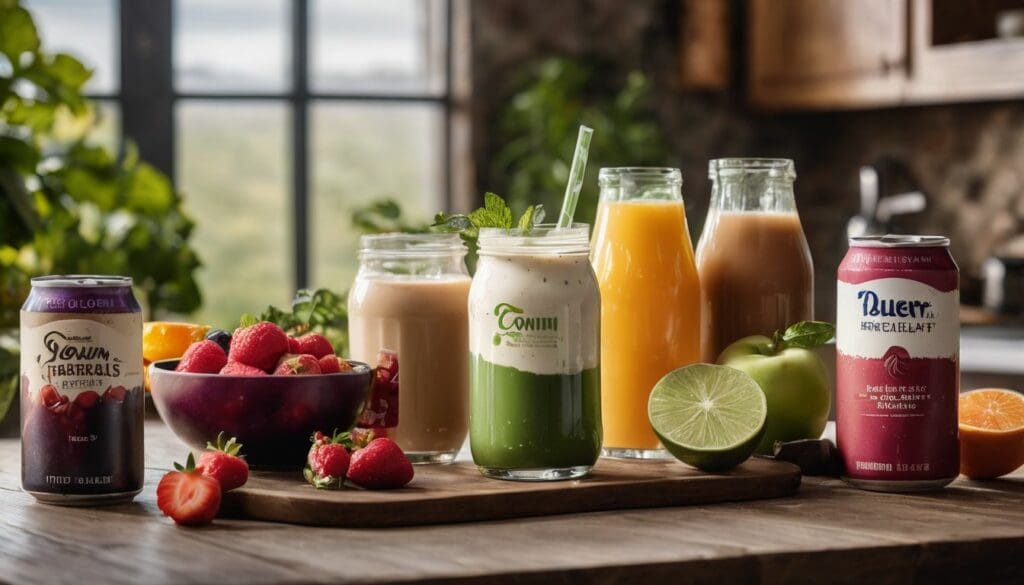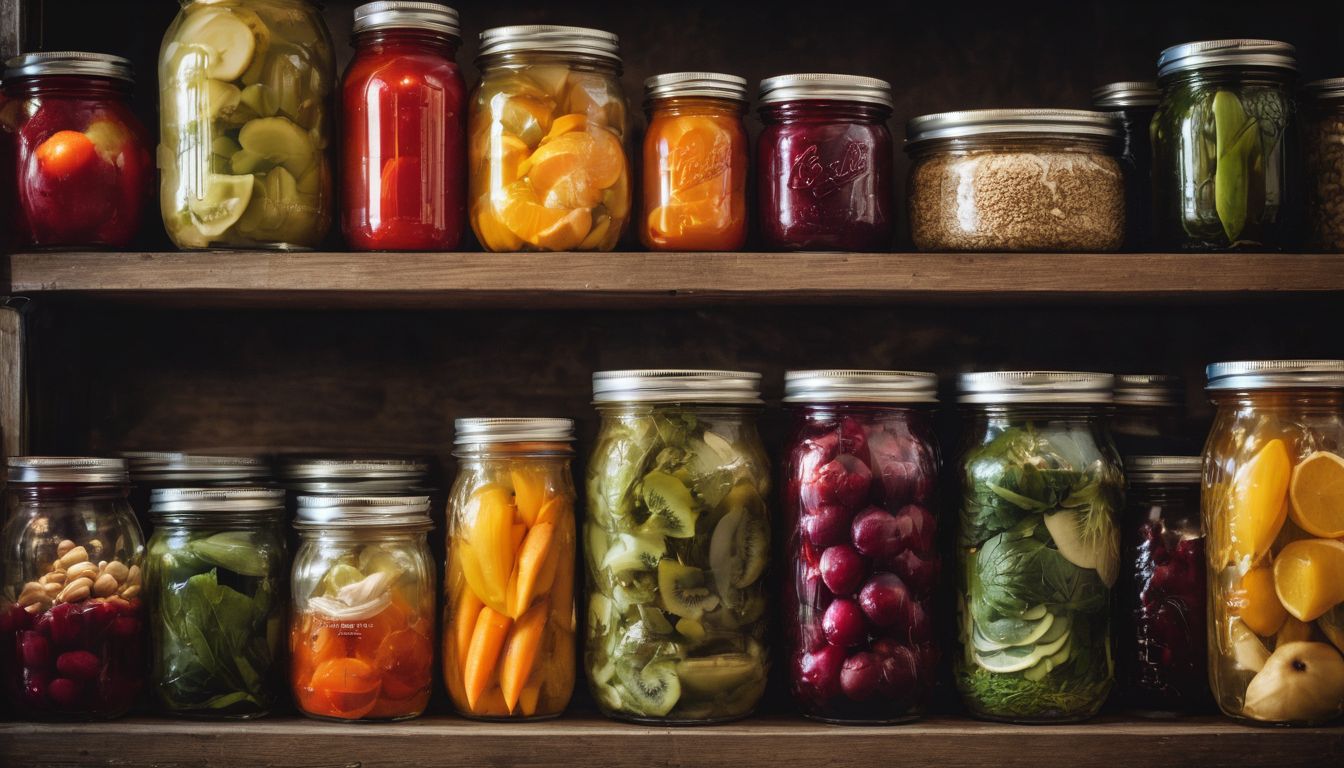Struggling to find the right dairy alternative that matches your taste and nutritional needs? You’re not alone; many are on this quest for milk substitutes. Our comprehensive guide shines a light on various dairy alternatives, exploring their flavors and health benefits.
Dive in and discover your perfect plant-based pour!
Key Takeaways
- Choosing dairy alternatives can benefit those with lactose intolerance or allergies, as they offer lactose-free and allergen-friendly options such as almond milk and soy milk.
- Dairy substitutes like almond, coconut, soy, oat, and rice milk come with distinctive tastes and nutrition profiles; for example, almond milk is low in calories but rich in vitamin E whereas soy milk is high in protein.
- Butter and cheese plant – based replacements are available ranging from spreads to aged cheeses made from nuts or other vegan ingredients that cater to varied taste preferences without compromising on health benefits.
- Environmental considerations are pivotal when selecting dairy alternatives; products like oat and soy milks have a lower environmental impact compared to their counterparts due to less resource-intensive production processes.
- Nutritional yeast flakes provide a cheesy flavour boost rich in B vitamins for meals while being eco-friendly. Similarly, non-dairy yogurts and ice creams offer creamy textures derived from plants like coconuts or almonds which suit different dietary requirements.
Understanding Dairy Alternatives
People choose dairy alternatives for various reasons, from lactose intolerance to ethical and environmental concerns. It’s important to vet brands and products carefully to ensure you’re getting the best flavor and nutritional value.
Why people choose dairy alternatives
Many choose dairy alternatives for health reasons, finding lactose-free options easier on the stomach. Dairy-free milk like almond and soy provide nutrients without discomfort that regular milk might cause.
Others opt for plant-based milk to steer clear of allergens found in cow’s milk, turning to nut milk varieties as a safe choice for their dietary needs.
Environmental considerations also drive the switch to nondairy substitutes. Vegan milk choices offer a kinder option to our planet, often requiring less water and land than traditional dairy farming.
Conscious consumers recognise that by selecting dairy-free products they contribute less to greenhouse gas emissions, making almond milk or oat milk not just a personal preference but an environmentally responsible decision.
How to vet brands and products
To vet brands and products:
- Look for certifications such as organic, non – GMO, or fair trade to ensure ethical and sustainable sourcing.
- Check the ingredient list for additives, preservatives, and artificial flavors which may compromise health benefits.
- Research the company’s commitment to environmental sustainability through packaging, waste reduction, and ethical business practices.
- Read customer reviews and ratings to gauge product quality and taste satisfaction.
- Compare nutritional content, including protein, calcium, vitamins, and minerals to choose options that align with individual dietary needs.
- Investigate the brand’s animal welfare policies if applicable.
Milk Alternatives
Discover the various options for milk alternatives such as almond, soy, coconut, oat, and rice milk. Each alternative comes with its unique flavor profile and nutritional benefits.
Almond Milk
Almond milk is a plant-based milk alternative made from almonds and water. It is a popular dairy substitute for individuals seeking lactose-free options. Almond milk contains no cholesterol and is naturally low in saturated fat, making it a heart-healthy choice.
With its slightly nutty flavor, almond milk can be used in cooking and baking as well as enjoyed on its own or in smoothies. This calcium-rich substitute provides essential nutrients such as vitamin E and magnesium.
Additionally, almond milk has a lower environmental impact compared to traditional dairy farming, making it an appealing choice for environmentally conscious consumers. Its production requires less water and land use while producing fewer greenhouse gas emissions, contributing to sustainability efforts.
Soy Milk
Soy milk, made from soaking and grinding soybeans, is a popular dairy alternative for those seeking a plant-based option. It is rich in protein, making it an excellent choice for individuals looking to increase their protein intake without consuming animal products.
Additionally, soy milk contains essential nutrients such as calcium, vitamin D and B12, providing a nutrient-rich beverage that can easily substitute cow’s milk in various recipes.
Moreover, environmentally conscious consumers may appreciate that soy production has a lower environmental impact compared to traditional dairy farming. As such, choosing soy milk over cow’s milk can contribute to sustainable and eco-friendly consumption habits.
Nutritional substitutes are abundant when it comes to soy milk – from its high-protein content to being fortified with essential vitamins and minerals like calcium and vitamin D – making it an ideal choice for those seeking lactose-free alternatives with added health benefits.
Coconut Milk
Coconut milk is a creamy, dairy-free alternative with a naturally sweet flavor, offering an excellent source of calcium and vitamin D. Produced from the white flesh of coconuts, it is suitable for those seeking lactose-free and plant-based milk options.
Rich in medium-chain fatty acids, coconut milk provides a nutritious substitute for traditional dairy products in both sweet and savory dishes. Versatile and delicious, it can be used as a base for smoothies, curries or desserts.
Moving on to “Oat Milk”, another popular non-dairy option that has gained popularity due to its versatility and nutritional benefits.
Oat Milk
Transitioning from coconut milk to oat milk, we turn our attention to another popular dairy alternative. Oat milk is a creamy and nutritious option for those seeking a plant-based milk alternative.
Made by blending soaked oats with water, oat milk offers a smooth texture and subtle sweet flavor. Rich in nutrients such as fiber, vitamins, and minerals, oat milk is an excellent source of calcium and vitamin D for those looking for nondairy options that support bone health.
Oat milk is versatile not only in taste but also in usage, making it an ideal choice for eco-conscious individuals seeking sustainable alternatives. With its impressive environmental footprint compared to traditional dairy products or other plant-based milks, oat milk production requires less water and land use while emitting fewer greenhouse gases.
Rice Milk
Rice milk is a popular dairy alternative made from milled rice and water. It’s often fortified with essential nutrients like calcium, vitamin D, and B vitamins to match the nutritional value of dairy milk.
With its naturally sweet flavor and smooth texture, it’s a delicious choice for those seeking a lactose-free or nut-free option. Rice milk also works well in cooking and baking, making it a versatile choice for environmentally conscious individuals looking to reduce their environmental impact while enjoying their favorite dishes.
Transitioning from dairy to rice milk can provide a sustainable solution that still offers essential nutrients in an eco-friendly way. By choosing rice milk as part of your plant-based diet, you’re supporting conservation efforts and reducing the demand for animal-derived products.
Alternatives for Butter and Cheese
Discover the wide range of butter and cheese alternatives available, from creamy spreads to hard, aged options made from plant-based ingredients. Whether you’re looking for a dairy-free option or simply want to try something new, there are plenty of delicious alternatives to explore.
Butter alternatives
Dairy-free butter alternatives offer a variety of options for those looking to reduce their dairy consumption. Whether you’re health-conscious or environmentally aware, these substitutes provide great versatility and flavours for cooking, baking, and spreading.
- Margarine: This vegetable-oil-based spread is widely available and can be used as a substitute for butter in most recipes. Look for options with minimal processing and no trans fats.
- Coconut oil: A popular choice for its creamy texture and subtle coconut flavor. It’s suitable for both savory and sweet dishes, with the added benefit of being rich in healthy fatty acids.
- Nut butters: Almond, cashew, or macadamia nut butter can add a rich, nutty taste to your dishes while providing healthy fats and proteins.
- Avocado: Mashed avocado can replace butter on toast or in baking recipes, adding a creamy texture and heart-healthy monounsaturated fats.
- Olive oil: This kitchen staple can work well as a spread or in cooking and baking. Opt for extra virgin olive oil for its robust flavor and health benefits.
- Applesauce: For baked goods, unsweetened applesauce can substitute some or all of the butter without compromising on moisture or flavor.
- Hummus: A spread made from chickpeas is not just great for dipping; it also offers a creamy consistency that works well as a dairy-free alternative to butter on sandwiches or wraps.
Soft cheese alternatives
When replacing dairy-based Soft Cheese, environmentally conscious individuals can choose from a variety of plant-based options. These alternatives offer delicious flavors and textures while providing nutritional benefits. Some soft cheese alternatives include cashew-based spreads, almond milk ricotta, tofu-based creamy cheeses, and coconut milk cream cheese. Each option offers its unique taste and texture, making it easy to find the perfect substitute for different recipes or occasions.
Hard cheese alternatives
For hard cheese alternatives, look for plant-based options made from ingredients like cashews or almonds. These dairy-free alternatives are rich in flavor and can be used in a variety of dishes. They are often fortified with Vitamin B12, making them a suitable substitute for traditional hard cheeses. When choosing hard cheese alternatives, consider the texture and melting properties to ensure they meet your culinary needs.
- Cashew-based hard cheese: Known for its creamy texture and nutty flavor, this alternative offers a versatile option for grating and melting in recipes such as pasta dishes and gratins.
- Almond-based hard cheese: With its slightly sweet undertones, almond-based hard cheese can add depth of flavor to charcuterie boards and salad toppings.
- Nutritional yeast flakes: This savory, umami-rich alternative adds a cheesy flavor to sauces, popcorn, or roasted vegetables without the need for melting or grating.
- Coconut oil-based hard cheese: Ideal for adding richness to vegan lasagnas or casseroles, coconut oil-based hard cheeses offer a creamy mouthfeel.
Nutritional yeast
Nutritional yeast is a popular dairy alternative for adding a savory, cheesy flavor to dishes. It’s packed with essential nutrients such as B vitamins and protein, making it an excellent addition to vegan and vegetarian diets.
Additionally, nutritional yeast can be sprinkled on popcorn, salads, or pasta for a nutritious boost of flavor.
When considering dairy alternatives, nutritional yeast provides a versatile and tasty option that supports eco-friendly eating habits while still delivering essential nutrients. Whether you’re seeking a cheese substitute or simply aiming to enhance the flavor of your meals, nutritional yeast offers an environmentally conscious solution.
Yogurt and Ice Cream Alternatives
From dairy-free yogurt options to delicious ice cream alternatives, there are plenty of plant-based choices to explore.
Discover the flavours and nutritional value of these tasty alternatives in our blog!
Yogurt alternatives
Dairy-free yogurt alternatives provide a variety of options for individuals who are environmentally conscious and support conservation efforts. These alternatives offer the creamy texture and tangy flavor of traditional yogurt while being plant-based and dairy-free.
- Coconut-based yogurts:
- Made from coconut milk, these yogurts offer a rich, creamy texture and a hint of natural sweetness.
- Almond-based yogurts:
- Created from almond milk, these yogurts have a smooth consistency and a slightly nutty flavour.
- Soy-based yogurts:
- Using soy milk, these yogurts have a creamy texture with a mild flavour perfect for mixing with fruits or granola.
- Oat-based yogurts:
- Produced from oat milk, these yogurts have a mild taste and creamy consistency, making them suitable for various toppings or mix-ins.
- Cashew-based yogurts:
- Made from blended cashews, these yogurts offer a luxurious creaminess and decadent taste.
Ice cream alternatives
Looking for dairy-free ice cream alternatives? Look no further. There are a variety of delicious options that support conservation and environmental initiatives. Try these environmentally friendly choices:
- Coconut milk ice cream – Creamy, tropical flavour with a hint of coconut.
- Almond milk ice cream – A nutty and smooth alternative with a light texture.
- Soy milk ice cream – Rich, creamy, and available in various flavours.
- Cashew milk ice cream – Smooth and velvety, perfect for indulgence.
- Oat milk ice cream – Naturally sweet with a subtle oaty taste.
Health Benefits of Dairy Alternatives
6. Health Benefits of Dairy Alternatives include reduced lactose intake, allergen-friendly options, and lower calories and fat content. Read on to discover the nutritional value of dairy alternatives.
Reduced lactose intake
Consuming dairy alternatives leads to reduced lactose intake, benefiting those with lactose intolerance. These options, such as almond milk or coconut milk, offer a delicious and sustainable alternative for environmentally conscious individuals.
Nondairy yogurt and cheese substitutes also provide the same benefits, making it easier to enjoy meals without the discomfort of lactose.
Individuals seeking calcium-rich substitutes can find nut milk options appealing due to their nutritional value. The availability of nondairy products has made it simpler for those sensitive to lactose to maintain a balanced diet without sacrificing taste or essential nutrients.
Allergen-friendly
When choosing dairy alternatives, consider allergen-friendly options. Look for products that are free from common allergens like nuts, soy, and gluten. Opting for allergen-friendly substitutes ensures inclusivity for those with dietary restrictions or allergies.
By choosing these alternatives, you can support a more inclusive and diverse food industry.
Choosing allergen-friendly dairy alternatives promotes accessibility and consideration for individuals with different dietary needs while still enjoying delicious and nutritious options.
Low in calories and fat
Dairy alternatives, such as almond milk and soy milk, are low in fat and calories. They provide a healthier option for those looking to reduce their calorie and fat intake while still enjoying the creamy texture of traditional dairy products.
This makes them an ideal choice for individuals focused on maintaining a balanced diet and managing their weight. Additionally, opting for dairy-free alternatives can also contribute to supporting sustainable agricultural practices, making it easier for environmentally conscious consumers to make eco-friendly choices.
Incorporating dairy alternatives into your daily routine not only provides health benefits but also supports environmental conservation efforts by reducing the carbon footprint associated with traditional dairy production methods.
Choosing the Right Dairy Alternative
Consider factors such as dietary restrictions, taste preferences, and cooking/baking suitability when choosing the right dairy alternative for you. Compare the nutritional value and explore different options to find the best fit for your needs.
Factors to consider
When choosing dairy alternatives, consider factors such as nutritional value and taste to find the best plant-based option for your needs. Nutritional value comparison between different products is essential to ensure you get the necessary nutrients like calcium.
Additionally, assessing the taste and suitability of each alternative for cooking and baking will help you make a well-informed choice that aligns with your environmental values.
It’s important to carefully evaluate these factors when selecting dairy alternatives to find options that not only complement your lifestyle but also contribute positively to conservation efforts.
Nutritional value comparison
Selecting the right dairy alternative involves comparing their nutritional profiles. Below is a table that summarises key nutritional aspects of popular plant-based milks, providing insight for those who prioritise environmental sustainability alongside health.
| Dairy Alternative | Calories (per 100ml) | Protein (g) | Carbohydrates (g) | Fat (g) | Calcium (mg) | Sugar (g) | Environmental Impact* |
|---|---|---|---|---|---|---|---|
| Almond Milk | 17 | 0.6 | 0.6 | 1.5 | 120 | 0.3 | Low-Medium |
| Soy Milk | 54 | 3.3 | 6.3 | 1.8 | 25 | 4.0 | Low |
| Coconut Milk | 24 | 0.2 | 1.1 | 2.1 | 120 | 0.2 | Medium |
| Oat Milk | 43 | 1.0 | 6.7 | 1.4 | 120 | 4.1 | Low |
| Rice Milk | 47 | 0.3 | 9.4 | 1.0 | 120 | 4.4 | Medium-High |
*Environmental impact refers to water use, land use, and greenhouse gas emissions associated with production. Values are indicative and can vary by brand and production practices.
Understand the trade-offs between nutrition and environmental impact. Some milks may be low in calories but have a higher environmental footprint. Choose products that align with both your dietary needs and your commitment to conservation.
Taste and cooking/baking suitability
When considering dairy alternatives, it’s crucial to assess their taste and how well they perform in cooking or baking. Almond milk offers a nutty flavor that complements both sweet and savory dishes, while soy milk provides a creamy texture suitable for making sauces and desserts.
Coconut milk adds a rich, tropical twist to curries and smoothies, and oat milk offers a mild taste ideal for coffee drinks and breakfast recipes. Rice milk is subtly sweet, making it versatile for various culinary applications.
Butter alternatives like vegan margarine or coconut oil can be used for spreading on bread or melting into recipes. Soft cheese substitutes made from cashews or almonds are perfect for adding creaminess to dishes, while hard cheese replacements crafted from nuts offer robust flavors for grating over pasta or salads.
Nutritional yeast is an excellent option to add savory umami notes to dishes without dairy-based cheese.
Conclusion
In conclusion, dairy alternatives offer a wide range of flavors and nutritional value. They cater to various dietary needs, from lactose-free options to plant-based substitutes. Understanding the benefits and versatility of these alternatives can help individuals make informed choices for their health and the environment.
Whether it’s milk, butter, cheese, yogurt or ice cream alternatives – there are plenty of delicious options available for those seeking dairy-free products.
FAQs
1. What types of plant-based milk alternatives are there?
There are various plant-based milk alternatives such as almond, soy, oat, and coconut milks which all offer different flavors and nutritional benefits.
2. Are dairy-free options also good sources of calcium?
Yes! Many dairy-free options like fortified nut milk alternatives and lactose-free products are enriched with calcium to support dietary needs.
3. Can I find non-dairy yogurt if I’m lactose intolerant?
Absolutely, there is a range of non-dairy yogurt options available that cater to those who are lactose intolerant or prefer plant-based diets.
4. What can I use instead of butter for a dairy-free diet?
For a dairy-free diet, you can opt for butter replacements made from plant oils that provide similar texture and flavour without any dairy content.
5. Is it possible to get nutritional substitutes in non-dairy cheese products?
Certainly – many nondairy cheese varieties have been designed to offer nutritional substitutes that match traditional cheese’s taste and health benefits.





